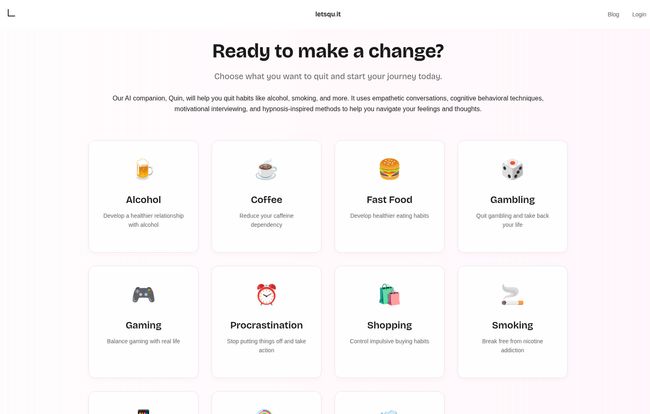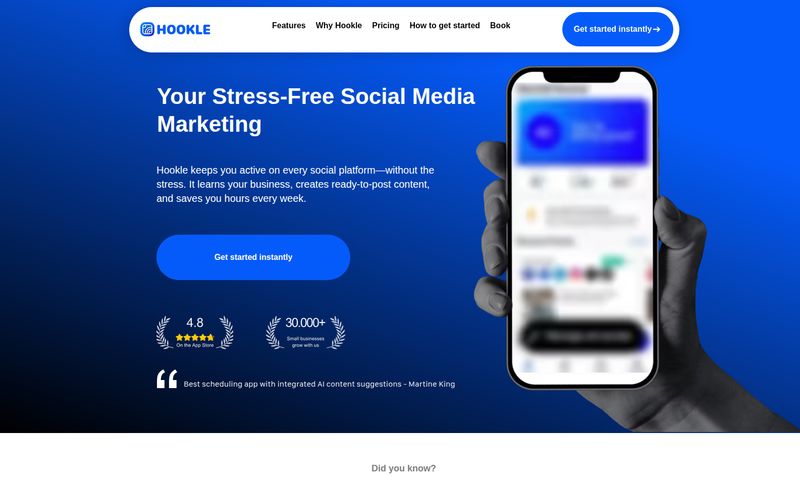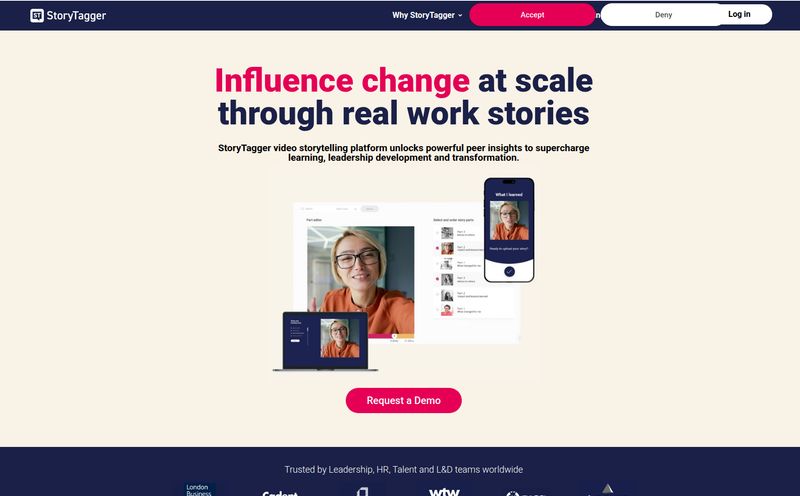We’ve all been there. That Sunday evening promise to yourself: “This week, I’m definitely going to stop…”
…doomscrolling on TikTok until 2 AM.
…drinking that third cup of coffee that just makes you anxious.
…buying stuff online you don't really need.
Breaking a habit is hard. Like, really, really hard. It’s a battle fought in your own head, and sometimes, willpower alone feels like bringing a butter knife to a sword fight. As someone who’s been in the SEO and digital trends space for years, I've watched the wellness app market explode. Meditation apps, fitness trackers, calorie counters… you name it. But most of them are just that—trackers. They log data, but they don’t always get into the 'why'.
So when I stumbled upon a platform called Letsqu.it, my curiosity was piqued. Its premise is simple but bold: an AI-powered companion to help you quit your habits. Not just track them, but actively help you stop. An AI life coach? Color me intrigued.
So, What Exactly is Letsqu.it?
At its heart, Letsqu.it is a platform built to be your personal cheerleader and guide in the tough process of behavior change. The star of the show is an AI companion named 'Quin'. According to their site, Quin uses a mix of empathetic conversations, proven psychological techniques, and even hypnosis-inspired methods to help you get a handle on your thoughts and feelings. It’s not just a chatbot spitting out generic advice.
The first thing you see on their homepage is a clean, inviting grid of common struggles. We’re talking about the big ones like smoking and alcohol, but also the more modern-day demons like social media addiction, procrastination, and impulsive online shopping. It feels comprehensive. It feels like they get it.

Visit Letsqu.it
This isn’t about shaming you. The whole vibe is supportive, starting with the headline: “Ready to make a change?” It feels less like an ultimatum and more like a friendly, helping hand. I’ve seen a million landing pages, and this one has a certain warmth that’s often missing in tech.
How This AI Habit Coach Aims to Help
Okay, so it sounds nice, but what’s it actually doing? An “empathetic AI” is a lofty claim. From what I can gather, the approach is layered, which I appreciate. It's not just a one-trick pony.
The Brains Behind the Bot: CBT and More
Letsqu.it mentions it uses Cognitive Behavioral Techniques (CBT), motivational interviewing, and other methods. For anyone not familiar, CBT is a cornerstone of modern therapy. The core idea, and I'm simplifying here, is that our thoughts, feelings, and behaviors are all interconnected. To change a behavior (like lighting a cigarette), you first need to identify and reframe the thoughts and feelings that lead to it (like “I’m so stressed, I need a smoke”).
An AI that can walk you through that process is… fascinating. Think of it. It’s 11 PM, you’re feeling an urge, and you can’t call a therapist. But you could, in theory, chat with Quin. This AI could help you identify the trigger, challenge the thought, and suggest an alternative. That kind of instant intervention is something human support, for all its strengths, just can't offer 24/7. The American Psychological Association has tons of resources on the effectiveness of CBT, and seeing it as a foundation here gives the platform some serious credibility.
From Vaping to Procrastination: The Habits Covered
I was genuinely impressed by the range of habits they cover. It's not just the usual suspects. Sure, you have alcohol, smoking, and vaping. But then you have:
- Gaming: Helping you find a better balance with real life.
- Procrastination: The arch-nemesis of… well, pretty much everyone I know.
- Sugar & Fast Food: Tackling those cravings and developing healthier eating patterns.
- Social Media: For anyone who's ever lost an hour to the endless scroll.
This wide scope shows an understanding that a 'bad habit' isn’t a monolith. It's a personal struggle, and my struggle with caffeine is different from someone else’s struggle with gambling. By offering specialized paths, it feels more personal and less like a one-size-fits-all solution that rarely fits anyone perfectly.
The Good, The Bad, and The AI
No tool is perfect, right? After digging around and thinking about this from a user and a tech perspective, here’s my breakdown. This isn’t a sterile pros and cons list; it’s just what I think after looking it over.
On the one hand, the potential for personalized, 24/7 support is huge. The biggest barrier to change is often inertia and the feeling of being alone in your struggle. An empathetic AI companion could be a game-changer for people who are intimidated by traditional therapy or just need support in a moment of weakness. It's accessible, it's private, and it's always on.
However, I have to wonder about the limitations. An AI, no matter how well-programmed, lacks true consciousness and lived experience. It operates on patterns and data. For many, that might be enough. For some, it might feel hollow. There’s also the elephant in the room with any AI platform: data privacy. You’re sharing some of your most vulnerable thoughts and behaviors. I’d want to read their privacy policy with a fine-tooth comb to understand exactly what happens to that data. It’s a trade-off we’re all getting more used to, but one that needs serious consideration here.
And of course, its effectiveness hinges entirely on your own commitment. Quin can offer all the CBT-based wisdom in the world, but you still have to be the one to put down the phone or walk past teh fast-food joint. It's a tool, not a magic wand.
| What's Promising | Potential Hurdles |
|---|---|
| Personalized support using proven psychological methods like CBT. | Reliance on AI may not be suitable for everyone's personality or needs. |
| Covers a very wide and relevant range of modern habits. | Effectiveness depends heavily on individual motivation and honesty. |
| Empathetic, non-judgmental tone is a huge plus. | Potential privacy concerns over sharing sensitive personal data. |
Even Their 404 Page Has Personality
This is a little thing, but it’s something I always look for as a sign of a company that cares about user experience. I tried navigating to a non-existent page to see what would happen. Instead of a sterile, default “Not Found” error, I got a custom 404 page. It’s cute, on-brand with its pink and white design, and the copy is perfect: “The page you’re looking for seems to have wandered off. Don’t worry though — let’s get you back on track to making positive changes in your life.”
It’s a tiny detail in the grand scheme of things. But it shows a level of thoughtfulness that suggests the creators aren't just shipping code, they're building an experience. It made me smile, and it reinforced the supportive, human-centric feeling of the whole platform.
Pricing: What's the Investment?
This is the big question for many people. As of my review, there’s no public pricing page available on the Letsqu.it site. This could mean a few things. It might be in a beta phase and still free for early users. It could be preparing to launch a subscription model—which is standard for apps in this category. Or perhaps pricing is revealed after you sign up and go through an onboarding process.
Personally, I would expect a freemium model or a tiered subscription. Maybe a free version with basic chat and a premium tier that unlocks more advanced techniques, deeper analysis, or more intensive coaching. For now, we'll have to wait and see. If you decide to check it out, you'll likely find out the cost during the sign-up process.
Frequently Asked Questions About Letsqu.it
- 1. Is Letsqu.it a replacement for a human therapist?
- I would say no. It's best seen as a supportive tool. For severe addiction or mental health conditions, consulting a qualified human professional is always the best course of action. This tool could be a great supplement to therapy or a first step for those dealing with more manageable habits.
- 2. How does the AI “Quin” actually work?
- It's a sophisticated chatbot powered by large language models, specifically trained on psychological principles like Cognitive Behavioral Therapy (CBT), motivational interviewing, and empathetic communication to guide users through their habit-breaking process.
- 3. Is my data safe with Letsqu.it?
- This is a critical question. Like any app where you share personal information, you should carefully review their privacy policy. Reputable platforms will use encryption and anonymization to protect user data, but it's always wise to be informed.
- 4. What habits can Letsqu.it help with?
- It covers a broad spectrum, including smoking, vaping, alcohol, caffeine, fast food, sugar, social media, gaming, gambling, procrastination, and impulsive shopping.
- 5. Is there a mobile app for Letsqu.it?
- The website functions as the main platform, which makes it accessible on any device with a browser. At the time of this review, information on a dedicated native mobile app (iOS or Android) isn't prominently displayed, but the web experience is designed to be mobile-friendly.
Final Thoughts: A Step in a New Direction?
So, what’s the verdict? I’m cautiously optimistic. I love the concept. Using AI to deliver personalized, affordable, and stigma-free mental wellness support is a powerful idea. Letsqu.it seems to be approaching it with a lot of thought, grounding its AI in real, proven techniques and wrapping it in a friendly, supportive package.
Is it the magic bullet that will instantly solve all your problems? Of course not. Nothing is. But as a tool—a companion for the difficult moments, a guide to understanding your own triggers, a cheerleader that never sleeps—it has some serious potential. If you’ve tried and failed to break a habit on your own and are looking for a new angle, it might just be worth having a conversation with Quin.
Reference and Sources
- Letsqu.it Official Website: https://letsqu.it/
- American Psychological Association on CBT: https://www.apa.org/ptsd-guideline/patients-and-families/cognitive-behavioral-therapy



